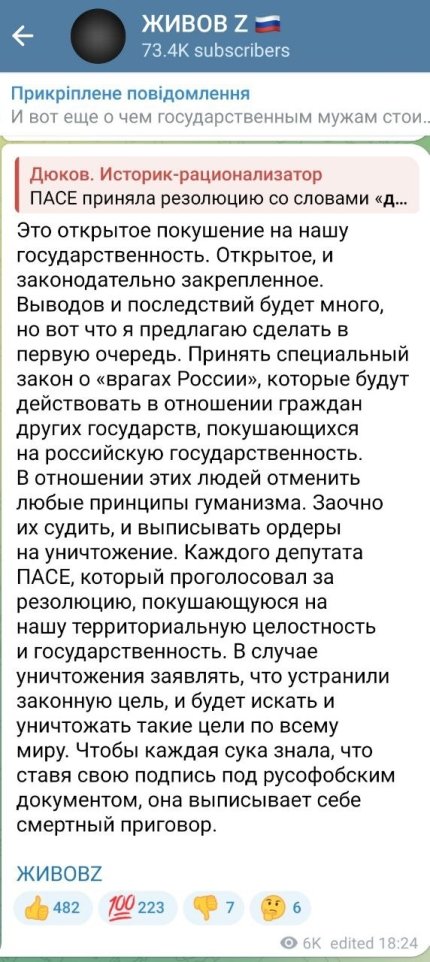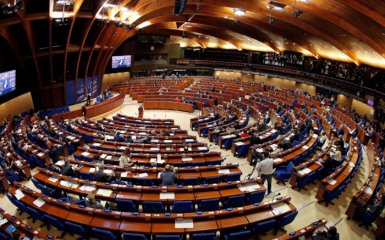On April 17, the Parliamentary Assembly of the Council of Europe (PACE) unanimously supported the resolution "Navalny's death and the need to oppose Putin's totalitarian regime and his war against democracy" by Emmanuel Zingeris.
The urgent PACE resolution on the decolonisation of Russia: what is known
All amendments to the resolution from the Ukrainian delegation were taken into account.
This was reported by the head of the Permanent Delegation of Ukraine to the Parliamentary Assembly of the Council of Europe, the head of the Temporary Special Commission of the Verkhovna Rada of Ukraine on issues of interaction with the enslaved indigenous peoples of the Russian Federation, Maria Mezentseva.
Since coming to power, Putin has been building a regime whose goal is to wage war against democracy and reshape the European and world order established after the collapse of the former Soviet Union. The occupation of Transnistria, the invasion of Georgia in 2008, the war in Ukraine since 2014, the illegal annexation and occupation of territories, the destruction of freedom of speech inside Russia, the disinformation war around the world, the persecution and assassination of its political opponents inside and outside Russia, and the creation systems of legislation that criminalise political views are only some, but not all, of the features of Putin's regime.

Maria Mezentseva
Head of the Permanent Delegation of Ukraine to PACE
The main points of the historic PACE resolution
PACE resolution adopted on April 17:
emphasises that according to international humanitarian law, Russian oil refineries should be considered legitimate targets of military attacks;
deplores the fact that the acts of torture to which Navalny was subjected are systematically used against political prisoners in the Russian Federation and Ukrainian prisoners of war, as stated in Resolution 2528 (2024). According to the UN Human Rights Monitoring Mission in Ukraine, the majority of Ukrainians in Russian captivity suffered torture, rape, threats of sexual violence, deprivation of food and sleep, and other forms of ill-treatment.
In the Russian Federation, Ukrainian political prisoners have been illegally detained in Russian prisons since 2014.
calls on the European Union and the G7 group to further strengthen the sanctions regime against the Russian Federation, in particular by significantly strengthening the sanctions regime by reducing the marginal price of oil, taking into account that the income from oil exports is and remains a significant source of income for the Russian state budget;
initiates the creation of a Register of States, individuals and legal entities aiding and abetting the Russian Federation in evading sanctions, including by providing it with the opportunity to obtain dual-purpose goods for military use;
calls for enforcement of the existing mandatory "oil spill insurance" requirement for all tankers passing through their waters to facilitate compliance with price cap sanctions and to protect the environment from oil spills caused by outdated and underinsured tankers;
imposing sanctions on the Moscow Stock Exchange, as well as Rosatom, the state-owned nuclear power monopoly that took control of Europe's largest nuclear power plant in Ukraine's Zaporizhzhia region, using it as a tool to blackmail Europe by raising the threat of a nuclear disaster;
calls on the United States, a Council of Europe observer state, to ensure that the Senate foreign aid bill, which includes military aid to Ukraine, is brought to a vote without further delay or otherwise allow the delivery of necessary military and other assistance to Ukraine as soon as possible
The PACE resolution has a separate block of amendments regarding the indigenous peoples of the Russian Federation
Since the Russian Federation is only a formal federation, Putin's regime has also declared war on its people.
In particular, indigenous peoples and national and ethnic minorities in Russia are forcibly Russified, subject to repression and discrimination, which is a violation of Russia's obligations under the International Convention on the Elimination of All Forms of Racial Discrimination. In particular, the Assembly notes the disproportionately high casualties suffered by the military units, which consist mainly of soldiers conscripted from national, ethnic and indigenous populations. The Assembly considers this a deliberate campaign to eliminate national and ethnic diversity in the Russian Federation.
PACE notes that the decolonisation of the Russian Federation is a necessary condition for the establishment of democracy.
PACE calls on member states of the Council of Europe and observers, the European Union and the United Nations, to pay attention to numerous violations of human rights and peoples' rights to the detriment of (the colonised indigenous peoples of the Russian Federation)
Ideology and the church of the Russian Federation
Putin's regime adheres to the neo-imperialist ideology of the "Russian world", which the Kremlin has turned into a tool of war-mongering. This ideology is used to destroy the remnants of democracy, militarise Russian society, and justify external aggression to expand Russia's borders to include all territories that were once under Russian rule, including Ukraine.
Yevgenia Kravchuk, deputy member of the Permanent Delegation to the Parliamentary Assembly of the Council of Europe, said that the PACE Assembly recognises that Putin's regime adheres to the neo-imperial ideology of "Russian world", which the Kremlin has turned into a tool for inciting war.
The hierarchy of the Moscow Patriarchate of the Russian Orthodox Church defends this ideology, declaring the war against Ukraine and the "satanic" West "a holy war of all Russians."
Therefore, the Assembly condemns such rhetoric and emphasises that incitement to commit the crime of aggression, genocide, and war crimes is a crime in itself. The Assembly calls on all states to treat Patriarch Kirill and the Russian Orthodox hierarchy as an ideological continuation of Putin's regime.

Evgenia Kravchuk
Deputy member of the Permanent Delegation of Ukraine to PACE
Our Estonian colleague Erik Cross proposed these amendments! Thank you!
In addition, according to Yevhenia Kravchuk, it was possible to adopt the amendment of the Ukrainian delegation, which calls on the member states of the Council of Europe and the EU to recognise the Russian Orthodox Church as an instrument of Russian influence and propaganda, which has nothing to do with the freedom of religion and expression guaranteed by international law!
The Russian public exploded with threats to the signatories of the PACE resolution.
Propagandists of the Russian Federation have already started threatening PACE. Yes, they call the historic resolution "Russophobic" and "an attempt on the statehood of the Russian Federation."

Russian bloggers propose to adopt a special law on "enemies of Russia" on this occasion.
According to this, the government awards international diplomats sentences in absentia, "writes orders for destruction," and "enforces them around the world"”



